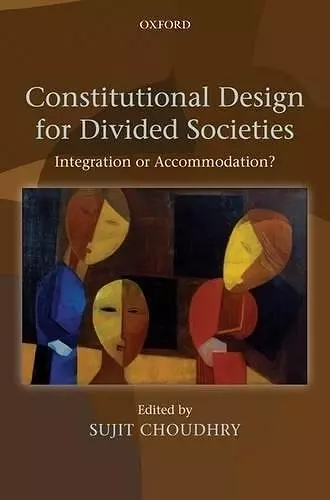Constitutional Design for Divided Societies
Integration or Accommodation?
Format:Hardback
Publisher:Oxford University Press
Published:27th Mar '08
Currently unavailable, and unfortunately no date known when it will be back

How should constitutional design respond to the opportunities and challenges raised by ethnic, linguistic, religious, and cultural differences, and do so in ways that promote democracy, social justice, peace and stability? This is one of the most difficult questions facing societies in the world today. There are two schools of thought on how to answer this question. Under the heading of accommodation, some have argued for the need to recognize, institutionalize and empower differences. There are a range of constitutional instruments available to achieve this goal, such as multinational federalism and administrative decentralization, legal pluralism (e.g. religious personal law), other forms of non-territorial minority rights (e.g. minority language and religious education rights), consociationalism, affirmative action, legislative quotas, etc. But others have countered that such practices may entrench, perpetuate and exacerbate the very divisions they are designed to manage. They propose a range of alternative strategies that fall under the rubric of integration that will blur, transcend and cross-cut differences. Such strategies include bills of rights enshrining universal human rights enforced by judicial review, policies of disestablishment (religious and ethnocultural), federalism and electoral systems designed specifically to include members of different groups within the same political unit and to disperse members of the same group across different units, are some examples. In this volume, leading scholars of constitutional law, comparative politics and political theory address the debate at a conceptual level, as well as through numerous country case-studies, through an interdisciplinary lens, but with a legal and institutional focus.
Drawing on the disciplines of law and political science, these essays bring theoretical sophistication to the study of constitutional design in general and to case studies of the design possibilities for constitutions in divided societies. This is one of the most important recent works on constitutional design, and should interest both lawyers and political scientists. * Mark Tushnet, Harvard Law School *
The resolution of conflict in divided societies is one of the most intensely, and extensively, joined 'grand debates' of political science in recent years. Yet while constitutional analysis and constituional design figure prominently in that debate, the discipline of constitutional law itself has been largely absent. This landmark volume changes all that, and does so in a way that significantly enhances the quality of discussion. By placing a group of first-class constitutional lawyers and political scientists in dialogue with one another over the competing paradigms of integration and accommodation across a diverse range of societies and jurisdictions, it delivers a mine of new empirical insights and theoretical refinements. All in all, the book succeeds in making a compelling argument for the multi-disciplinary study of divided societies, and in instantly establishing itself as a 'must-read' for all members of that emergent 'multi-discipline'. * Neil Walker, Edinburgh University *
This is a rich and provocative collection that will b e of value to a wide readership, including political scientists, legal scholars and public policy makers. Indeed, it should excite the sort of engagement by legal scholars-and not jsut comparative constitutionalists-that Choudry aims to provoke. * Robert Dunbar, The Edinburgh Law Review, Vol 13, 2009 *
An excellent collection of essays and merits the attention of all researchers interested in issues surrounding constitutional law, minority rights and ethnic conflict. * Laurence Cooley, Web Journal of Current Legal Issues, September 2009 *
CDDS is undoubtedly a resource for those who occupy the vast 'pragmatic' middle ground between the right and the left * Jeffrey B. Meyers, London School of Economics, the Modern Law Review *
ISBN: 9780199535415
Dimensions: 242mm x 162mm x 33mm
Weight: 890g
496 pages